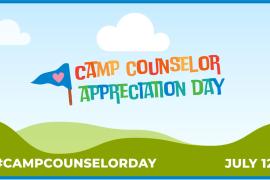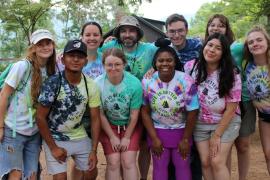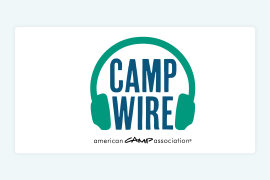I worked for years at camp, in a variety of positions, not because I was focused on my career, but because of the feeling I got doing the work. I enjoyed it. I was happy. But at the time, I could not articulate how camp was preparing me for “the real world”, or giving me the skills that I would need to call upon later in life. Now, after starting my own nonprofit organization, I realize that camp gave me invaluable skills that have led me to a meaningful and fulfilling career. I’m sharing them here, so that maybe they can inspire future camp staff:
The Importance of Play and Creativity
At camp, we learn how to take things that can feel mundane or even hard (like cleaning the dining hall), and make them fun and engaging. We know how to motivate people and keep them motivated. We know how to get people to accomplish something together. And, because we know that how you do something is as important as what you do, we know how to make sure that people are enjoying themselves and feel fulfilled at the same time. We can take the simplest thing, like a staff meeting, and make it exciting. With play and creativity, we know how to get people bought in.
How to Build Community and Organize
Our modern existence doesn’t prioritize community, but it’s essential to how we as humans relate to each other. In our ever increasing technology-driven and isolated world (especially during a pandemic), we are uniquely skilled at making people continue to feel connected to each other. At camp, we learn how to give people a sense of belonging and meaning, and an opportunity to be part of something bigger than themselves. You can give us a blank field with a group of people, and at the end of the day we’ll have activities, meals, organized schedules, and a strong sense of community.
How to Adapt and Be Creative to Solve Problems
With limited resources, camp forces us to constantly think “outside the box”. Take an actual cardboard box, for example, which, if necessary, could be a baseball base, a space helmet, an obstacle course feature or even a small boat. And that’s just activities. Anyone who has worked at camp learns to solve problems in creative ways, especially when put in charge of 10-12 children at the same time. We learn to deal with a scraped knee, homesickness, or an upset stomach, sometimes all at once, and are forced to learn how to prioritize, make a game plan quickly, and assure campers that they’ll be ok. That kind of “can do attitude” makes us uniquely prepared for anything that a future job could throw our way.
All of these skills helped me start my own nonprofit, Project:Camp, where we launch pop-up day camps to support children and their families after disasters. However, these skills are useful, desirable, and necessary in any workspace or career. By demonstrating how working at camp leads to real, valuable skills and experience, we can recruit and retain great staff year after year.
This blog was written on behalf of Project Real Job’s efforts to help camps recruit, hire, and retain staff.
Mikey Latner is the founder and executive director of Project:Camp.
The views and opinions expressed by contributors are their own and do not necessarily reflect the views of the American Camp Association or ACA employees.




